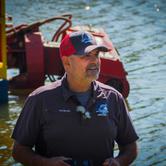How to Keep Pond Fish Alive in the Wintertime
American Underwater Services works on ponds and lakes nationwide. Many HOAs and golf courses have beautiful ponds to enhance their appearance, and in many cases, those ponds have fish. HOA and golf course managers understand the added value these fish ponds bring to the property, and each winter, they get concerned about how to make sure their fish survive. As experts in pond cleaning, we have a little advice. Winter can be challenging for pond owners and those tasked with their maintenance. Snow, freezing temps, and dead vegetation can make it seem like a winter wasteland. It’s natural to wonder—or even worry—if your scaly underwater friends are dead or just hibernating for a few months. We will show you what happens in a pond during the winter months and what you can do to help keep your fish happy and healthy throughout the cold season.
Fish and Winter
No matter if your pond is stocked with game fish, decorative fish (e.g., Koi), or fish to help keep nuisance insects and invasive plants in check, the fish need to be able to maintain their life support systems. Once the temperatures drop below 50F, your fish will start to slow down, reduce their food consumption, and essentially become dormant. This is their way of preserving energy during the cold winter months ahead. However, just because your fish are hibernating doesn’t mean they don’t need to breathe. A layer of ice across your pond can block the air/gas exchange critical to supporting aquatic life. Cutting a hole in the ice is a good idea so oxygen can reach the fish.
Parasites and Muck
Parasites are a fish’s worst enemy. They can cause infections, disease, and, in some cases, death. During the warmer months, fish have natural defenses that help protect against parasitic outbreaks. But in the colder months, things change dramatically. Cold and even freezing water doesn’t affect parasites as it does fish. If your pond hasn’t been dredged in a while, there is likely a massive pile of organic muck at the bottom. While your fish are comfortably resting in the water column, an enormous block party of parasites is living in that muck—and reproducing rapidly. Eventually, the parasites will tire of their dirt buffet and crave fresh seafood. A hibernating fish can’t defend itself against parasites since they tend to accumulate rapidly during winter. When the fish are no longer hibernating in the spring, they jump around as they try to dislodge the parasites. Contact us for more information on dredging your pond annually to keep this from happening.
Feeding Your Fish
Stop feeding your fish when the water temperature reaches 55 degrees Fahrenheit. At this point, fish start to enter hibernation. The fish will not eat the food pellets, and the food will fall directly into the pile of organic muck at the bottom. Even if the temperatures warm up for a few days, resist the urge to feed them. The fish might start to eat, but if another freeze occurs, their bodies will go right back into hibernation. Any leftover food inside their digestive tracts will putrefy, and that could kill them. Another reason you shouldn’t feed your fish during the winter is that the uneaten food can cause the nitrite and nitrate levels in your pond to explode out of control. This can lead to a big ammonia spike, which can be lethal to aquatic animals and fish.
Protect Your Plants
If you have decorative plants in the pond, such as lilies and lotus, try moving them to the deepest part of the water to help prevent them from freezing. Also, remove any floating water plants, as they will die when the water freezes. Trim any dead foliage from the plants with a pair of pruning tools. Even though they are dormant, it will prevent their systems from sending the necessary life-supporting nutrients to dead leaves and branches. Finally, remove as much debris from the surrounding banks and water columns as possible. This will help prevent a spike in harmful nutrients during the winter.
Nationwide Pond Dredging Experts
The best way to ensure the health of your fish and your pond is to schedule a pond dredging to remove the organic debris at the bottom after the first thaw. In addition to improving the water color and quality, this can help prevent nuisance algae outbreaks during the warm summer months. If you’d like to learn more about the benefits of dredging your pond or schedule an appointment, call us at (817) 377-8512. American Underwater Services has over 25 years of experience helping HOAs, golf courses, and homeowners improve the health and appearance of their ponds through our expert dredging services. [author_box]




